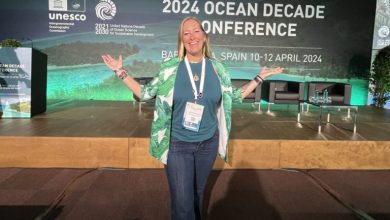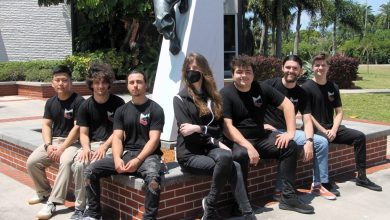Center of Hope
This fall, The Scott Center for Autism Treatment celebrates five years of service, training and research in the area of autism spectrum disorders (ASDs). When the center opened in 2009, the incidence of ASDs in the United States was 1 in 150 children. Today, that number has increased to 1 in 68 children affected.
In response, The Scott Center, too, has grown and adapted. Intensive early intervention services are complemented by a variety of social skills groups, community workshops and targeted training sessions. The center recently extended services into Indian River County, and its network of local, national and international partnerships has flourished.
No one can explain the impact of The Scott Center better than the families who have found hope through its services. This issue of Florida Tech Today shares three of their stories.[hr]

The Anderson Family
Our son Alex was diagnosed with autism spectrum disorder when he was three years old. Before attending The Scott Center for Autism Treatment, Alex was not able to request his wants and needs, rarely made eye contact and often wandered away from us in public. He only uttered two to three words at a time and frequently had meltdowns when in stores, crowds or when taken out of his “comfort zone.”
We found out about The Scott Center through Early Steps, which Alex attended for a year. Early Steps is also a great service for early intervention. Alex started to attend The Scott Center in October of 2013 for approximately 15 hours per week. Since beginning, life for the whole family has changed so much! Alex loves the center and is doing great. He is now greeting people without being prompted. He is able to make requests using full sentences. He answers yes/no questions and even general questions such as, what did you do today, how old are you, what is your name, and what is your mom’s/dad’s phone numbers. He is also making a lot more eye contact and is just all around a happier child. These are skills that many of us take for granted but are huge milestones for people with autism.
We are so grateful to The Scott Center for Autism Treatment for all that they do, and we are looking forward to the continued progress Alex will make thanks to The Scott Center for Autism Treatment![hr]
The Collins Family

When I first asked about ABA, I was told, “Oh you don’t want to do that, it’s very expensive, and the training is the same as training a dog.” I cannot argue that ABA can be very expensive, and many of the principles did emerge from behavioral psychological pioneers such as Pavlov. Despite animal origins, for our family, applied behavioral analysis has been invaluable, a lifeline in hurricane winds.
We came to The Scott Center four years ago, shortly after arriving back in the USA from the United Kingdom where Willow was born. A family friend had heard about this new cutting-edge facility at FIT and recommended we look into it. We toured the facility and did an intake. I felt like I had gone to a Porsche dealership on a tricycle, how on Earth could we afford this obviously top-of-the-line therapy? Regardless of my fears, we did the intake and waited for a spot to open up. I received a phone call that there was an opening, and miracle of miracles there was a grant that could be used to help pay the cost of therapy. At the time, our insurance wasn’t taken and we had no funds to pay ourselves.
When we began ABA, Willow did not listen to verbal instructions, did not communicate well, had sleep troubles, toileting issues and Pica (eating non-food materials). She loved and still loves to manipulate pine needles, and she used to eat them. This obviously upset her stomach, and I attribute many of her sleep problems to this behavior. Through an intervention using wheat grass and broccoli slaw, we have eliminated both the Pica and consequentially the majority of her sleep issues.
In many areas, Willow continues to make slow, steady progress, where we actually saw fast results was with the potty training program. Willow had a strong resistance and aversion to going to the bathroom in the toilet. There was many a mess that left me at my wit’s end. We had to do the intensive potty training program, and it truly was intense. We spent the day at the center and for weeks took data and followed a regiment. Willow had to wear an alarm on her underwear, but today my daughter has this essential skill, and I am eternally grateful. The Scott Center doesn’t just provide treatment, the parent training provides you with the confidence to know how to handle the new and challenging behaviors or situations that are bound to occur. When a new challenge arises, you have a sea of knowledge right there on hand—if your team is stumped, the entire staff consists of some serious rock stars in the autism research community. I have threatened to chain myself to Dr. Alison Betz desk if anyone ever tries to take her, Teal Labello or Becky Werle off Willow’s case.
Despite the odds, my daughter is defying negative prognosis and slowly pulling back the curtain of autism. Her speech has been slow to immerge, but her team is stellar and she makes breakthroughs daily. I hope some day every parent can have access to this facility and the hope that our family has been allowed.[hr]

The Hanley Family
I first heard about The Scott Center for Autism Treatment when our 4-year-old daughter, Madeline, was diagnosed with Pervasive Developmental Disorder. Her child psychologist recommended she begin applied behavioral analysis (ABA) therapy, a service provided by The Scott Center. She was already attending many hours of speech/language, occupational and physical therapy. Adding yet another “therapy” just didn’t seem practical or even possible. About a year later, while sitting in the waiting room of one her many therapy sessions, I noticed a flier that was looking for children diagnosed with autism spectrum disorder (ASD) to participate in a research project. My daughter fit the criteria, and on a whim, I called the number.
Just as I had no real knowledge of ABA, I also had no idea that The Scott Center was about to become my family’s life support system. After having her evaluated for the research project, the staff suggested that it might be more advantageous if Maddie was seen for intake services. Since that time, Maddie has been in intensive ABA therapy. Maddie is now 8 years old. Her impulsiveness, frequent tantrums and inability to attend tasks for longer than a just a few minutes have improved drastically. She was only partially toilet trained when she began ABA therapy at The Scott Center. Within weeks of parent training, Maddie was completely toilet trained. She no longer dashes into the street at any given second. With the help of a paraprofessional, Maddie is now able to attend school in a general education classroom.
Since Maddie began The Scott Center almost three years ago, our lives have changed significantly. The feelings of isolation and helplessness that parents experience when their child is diagnosed with ASD are overwhelming. The Scott Center has not only been a resource for Maddie, but it has been a blessing for our entire family. We are a part of a community of other families who are going through the same struggles and emotions. I can’t imagine what our lives would be like today if I hadn’t seen that flier and acted on a whim.
[box]Learn more about The Scott Center at www.thescottcenter.org or call (321) 674-8106.[/box]




